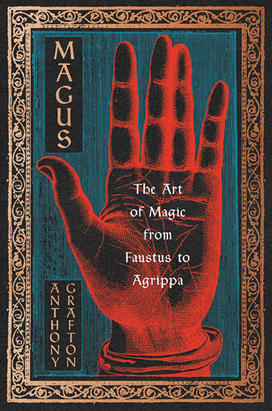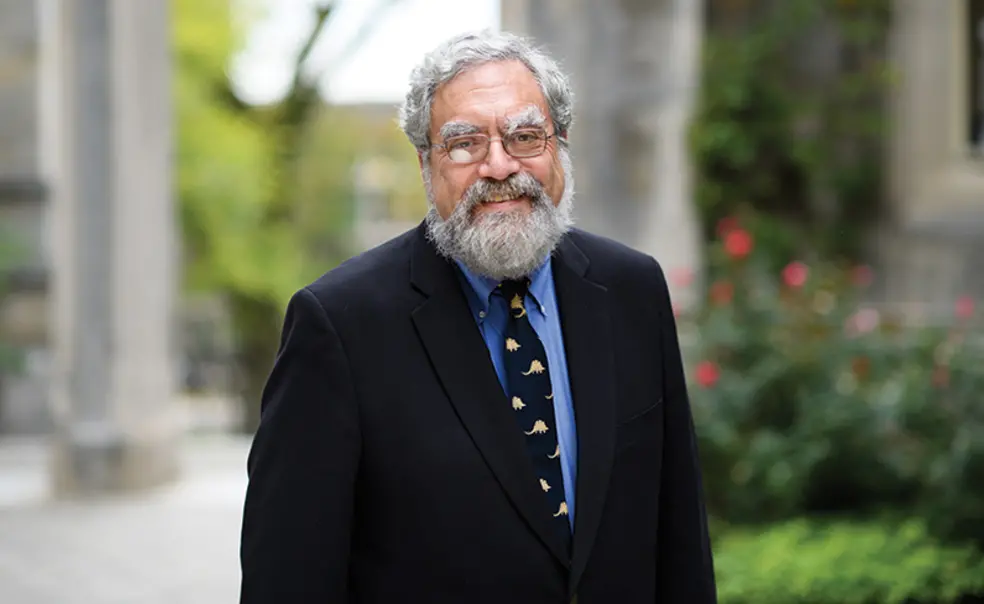Anthony Grafton Approaches His Final Year of Teaching
After nearly 50 years as a Princeton faculty member, Anthony Grafton, a historian of Renaissance Europe, will be retiring at the end of this academic year
While most careers might be depicted horizontally, as a timeline, professorial careers are sometimes expressed vertically, as a family tree. Academics, like football coaches, are linked to those they learned from, and to those who learned from them.
By that measure, Anthony Grafton’s academic tree is a massive oak. Its roots stem up from his own mentors, such as the great classical historian Arnaldo Momigliano, and its branches spread out to contain the names of nearly 50 graduate students whose dissertations he has advised, plus countless senior theses. That does not even count the hundreds of recommendation letters Grafton says students ask him to write every year to graduate schools, professional schools, and potential employers. He jokes about having all of them published.
Grafton, the Henry Putnam University Professor of History, has said that he will retire at the end of the 2024-25 academic year. Since joining the Princeton faculty in 1975, a year after earning his Ph.D. at the University of Chicago, he has been a prolific author, engaged professor, and tireless champion for the humanities. He is the author, co-author, or co-translator of 23 books (he speaks or reads eight languages), as well as the author of hundreds of articles for scholarly and mainstream publications.
Despite the centrifugal pull of being a somewhat public intellectual, Grafton remains close to his former students, who enjoy telling stories about their time studying with him. Elizabeth McCahill *05, now an associate history professor at the University of Massachusetts, Boston, recalls Grafton coaching her on Latin as she worked on her dissertation about a 15th-century papal secretary who wrote obscene poetry. Every Friday, they would meet at Small World Coffee, where she would translate the poems aloud to Grafton, enduring curious looks from other patrons.
“I’ve liked my students for almost 50 years. I just think they’re wonderful people and have enormous potential. If you manage to hit them the right way, they do incredible work.”
— Anthony Grafton
While most professors become mentors to their grad students, some, like Grafton, become a little bit more. A few years after she graduated, McCahill says, her longtime boyfriend planned to propose and asked if he should talk to her father first. “I told
him no,” McCahill laughs, “but you might want to talk to Tony.”
This academic year will be something of a victory lap for Grafton, though one he intends to take at full pace. He is teaching one course, on the practice of history since World War II (good training for seniors preparing their theses, he says), and is co-teaching two others, one on angels and devils in Western tradition and another on the human world in the Renaissance.

Grafton’s writing schedule won’t slow down, either. His most recent book, Magus: The Art of Magic from Faustus to Agrippa (Harvard University Press), was widely praised. He is also currently “a couple of hundred thousand words” deep into another manuscript, this one on early modern understandings of Christianity, which grew out of a series of Mellon Lectures he gave at the National Gallery of Art in 2014.
After that, who knows? “I’m just not sure,” he says about continuing to write after Princeton. “I feel I’ve done enough damage to the forests of North America.”
Looking back, Grafton says he thinks his short books may have been more influential than his longer ones. “If you want to have students read and discuss your work, going over 300 pages is not a great idea,” he suggests.
That is not to imply a lack of respect for the younger generation or their reading habits. “I’ve liked my students for almost 50 years,” Grafton says. “I just think they’re wonderful people and have enormous potential. If you manage to hit them the right way, they do incredible work.”
Grafton says he intends to move to the Bay Ridge neighborhood of Brooklyn, where his daughter, son-in-law, and oldest granddaughter live. (A son, his partner, and two other grandchildren live in Washington, D.C.) He fantasizes about spending his retirement picking up new novels at the local independent bookstore — author Marilynne Robinson is a current favorite — heading to a coffee shop, and just reading or watching the ships pass by.
One important matter remains unresolved: the disposition of Grafton’s wooden book wheel, six feet tall and several feet across, which sits in his home office and is where he keeps more than half a dozen lexicons and reference books. It is too big to take to Brooklyn, and as of late spring, Grafton was still trying to decide what to do with it. But not to worry, he says.
“A good book wheel will find a home.”










7 Responses
Ronan Wolfsdorf
1 Year AgoGrafton’s Intellect and Empathy
Professor Grafton was for a time my thesis adviser some 30 years ago, generously accepting this role though I was a doctoral student in history at another university (University of Chicago); thus we shared two almae matres, the other being University College London. As daunting as was his intellectual breadth, so disarming and kind was his common touch, empathy, and magnanimity. Anyone who studied with him must have been quickly amazed at how similar in ways he was to the pioneering, polyglot antiquarians he studied.
Bert Hansen *74
1 Year AgoGrafton’s Book Wheel
Although I finished my graduate work in history just before Tony Grafton arrived, his prolific and fertile writings have been a continuous stimulation to the work of historians of several generations. But I think PAW’s editors missed a golden opportunity in not giving us a photo of his “wooden book wheel six feet tall and several feet across, ... where he keeps more than half a dozen lexicons and reference books.” Some of us are familiar with such devices from early modern woodcuts and paintings. But they are rare today, and I hope that PAW will remedy this oversight by publishing a photograph.
Anthony Grafton’s wooden book wheel is partially visible in this photo, which ran with a PAW cover story about the professor in April 2007. Photo by Ricardo Barros
Seth Terry ’90
1 Year AgoFrom a Grateful Advisee
Kudos to PAW for providing this opportunity to highlight the role Professor Grafton played in our academic lives. I will never forget sitting in my first lectures in his European History course during freshman year. I quickly became hooked on history as a major and happily count myself among his thesis advisees. Thank you, Dr. Grafton!
Tom Sinclair ’71
1 Year AgoA Brilliant Scholar From the Start
I was a classmate of Tony’s at Andover, class of ’67. Even at that immature age, it was very apparent how brilliant he was, winning a number of academic prizes in Latin, Greek, Virgil, Homer, as well as being a National Merit finalist. I was thoroughly intimidated by how brilliant he was. In a class publication at the end of our senior year, Tony wrote a Homeric poem with the ending, “The spear of Mars lay limp upon his thigh.” Eighteen-year-olds don’t write like that, but it was easy for him. Tony, congratulations and best wishes!
James R. Fleming *88
1 Year AgoBest Wishes to Professor Grafton
In lectures and graduate precepts, Tony stimulated my interests in ancient, medieval, Renaissance, and might I say, “cosmic” issues. I left the classroom and the administrative meetings three years ago and, rather than retire, began my “permanent sabbatical.” Abundant good wishes to soon-to-be Emeritus Professor Grafton.
Janet Finnie '84
1 Year AgoAn Unforgettable Professor
I am an alum, ’84, a parent, ’22, and a staff member since 2000. I have forgotten many classes that I took while at Princeton. But I will never forget the class I took with Professor Grafton. It was one of the most engaging, effective educational experiences I’ve ever had. I am grateful.
Liza Schlafly Forshaw ’79
1 Year AgoIgniting a Love of History
I heartily second Ms. Finnie’s comment. One course with Professor Grafton ignited in me a lifelong love of reading history, and I am forever grateful. Best wishes for a well-deserved retirement!